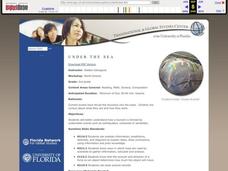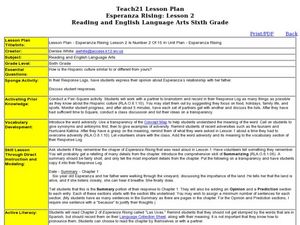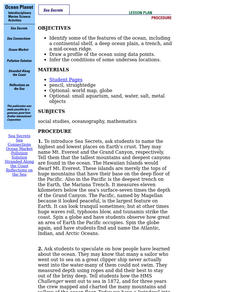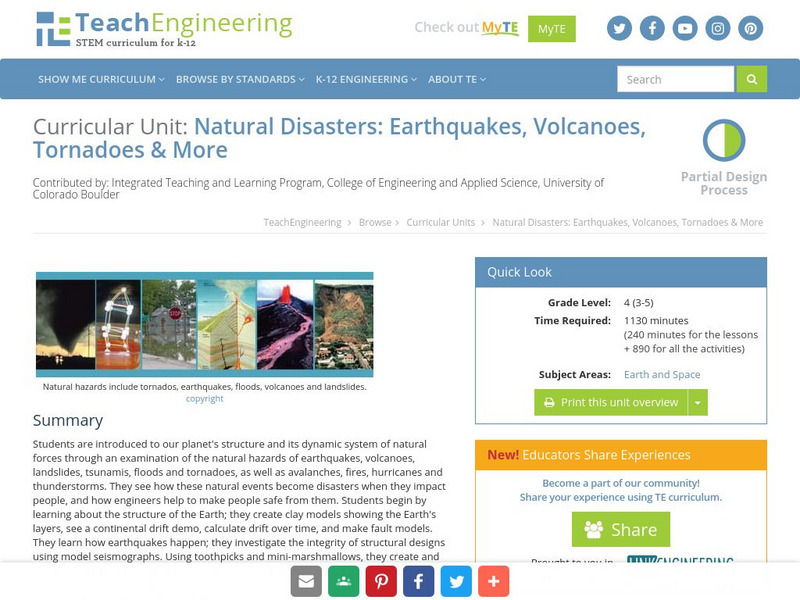Curated OER
Making Waves: A Study of Earthquakes and Tsunami
Students examine plate tectonics and the causative effect of earthquakes. In this tectonics instructional activity students differentiate between the types of energy waves that cause earthquakes and tsunamis and how waves travel at...
Curated OER
Tsunami - Five Years On
Students explore the issues of rebuilding after the Indonesian tsunami. In this reconstruction lesson plan, students investigate the reconstruction that followed the devastating event.
It's About Time
Making Waves
Young scientists use Slinkys to better understand waves. After creating and measuring many aspects of waves, they complete a handout and homework questions. The resource also introduces the final project for the chapter, though...
Curated OER
Earthquakes: Third Grade Lesson Plans and Activities
Introduce third graders to energy waves with a hands-on geology activity, in which they answer questions and compare seismograms in the San Francisco Bay area. After a demonstration that shows how bigger waves indicate a...
Curated OER
Waves Lesson Plan
Students demonstrate an understanding of tsunamis and possible causes. In this investigative lesson students view a video and explore earthquakes and movement of tectonic plates.
Curated OER
Under The Sea
Second graders study how a tsunami is formed by underwater events such as earthquakes, volcanoes or landslides. They discuss what they knew about living and non-living things in the ocean.
Curated OER
Checking the Surf
Learners read and discuss waves and their wavelengths and amplitudes. In this waves lesson plan, students draw the wavelength and amplitude of a wave and discuss tsunamis and storms.
Curated OER
Moving Mountains: Big Ideas Start Small
Students read case study about three students who led fundraising efforts for tsunami relief, discuss key concepts and vocabulary, identify problems in their own school or community, and brainstorm ways to solve problems.
Alabama Learning Exchange
Are You Prepared?
Pupils research specific natural disasters using the Internet and a collection of books. The natural disasters include; floods, hurricanes, tornadoes, tsunamis, winter stroms, wildfires, thunderstorms, volcanoes, and earthquakes. They...
Curated OER
Nanaotechnology: Small Science, BIG DEAL!
Students read an article that introduces them to the science and applications of nanotechnology. They discuss the the everyday examples of how nanotechnology is and can be used. In small groups, they observe and make inferences about...
Curated OER
Esperanza Rising: Lesson 2
Sixth graders explore adversity. For this summarizing lesson students compare their culture to the Hispanic culture. Students reflect on a time they were met with adversity. Students summarize Chapter 1 of Esperanza Rising.
Curated OER
Ocean Planet: Sea Secrets
Students identify ocean features and draw a profile using data points on a map. Through discussion and research, they discover the importance of oceanography and plot a profile of the ocean floor in search for a vessel full of precious...
Curated OER
Science Videos
Students plan, practice, and act in a 2-3 minute videotaped production about a specific topic. Students from a local high school give presentations pertaining to seasons, earth rotation, and moon phases. Students analyze the...
Curated OER
Slush Rush
Students navigate software to help students understand the benefits of computer models. In this computer models lesson, students use computer inquiry tools to record simulated events and how they affect objects such as houses or...
TeachEngineering
Teach Engineering: Checking the Surf
This lesson introduces the concepts of wavelength and amplitude in transverse waves. In the associated activity, students will use ropes and their bodies to investigate different wavelengths and amplitudes.
TeachEngineering
Teach Engineering: Natural Disasters
Students are introduced to our planet's structure and its dynamic system of natural forces through an examination of the natural hazards of earthquakes, volcanoes, landslides, tsunamis, floods and tornados, as well as avalanches, fires,...
TeachEngineering
Teach Engineering: Naturally Disastrous
Students are introduced to natural disasters, and learn the difference between natural hazards and natural disasters. They discover the many types of natural hazards - avalanche, earthquake, flood, forest fire, hurricane, landslide,...
PBS
Pbs Learning Media: Environmental Public Health: Natural Hazards
In this lesson plan, students are introduced to a variety of natural hazards and explore how understanding these threats make us better able to avoid or reduce their potential harmful impact.



















